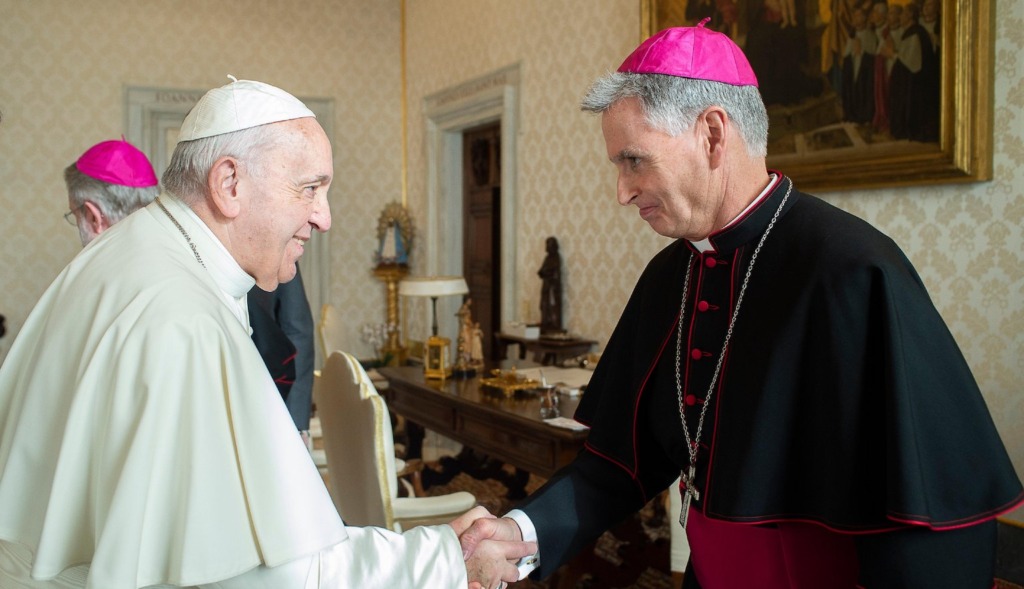WASHINGTON – Addressing Catholic educators at an annual national conference, Bishop Thomas A. Daly of Spokane, Washington, urged them to make sure their work was always rooted in the importance of the Eucharist.
The bishop, chairman of the U.S. Conference of Catholic Bishops’ Committee on Catholic Education, said schoolteachers should help their students more deeply appreciate the sacrament amid the current National Eucharistic Revival.
Launched June 19, the feast of Corpus Christi, the revival is a three-year initiative of the USCCB to revitalize Catholics’ understanding of and love for Jesus in the Eucharist.
At the National Eucharistic Congress that will close the revival in 2024, Bishop Daly said, “there will be a great emphasis on the work that Catholic schools can do and how they might help the next generation … to appreciate, to know and to love Jesus Christ” in the Eucharist.
The bishop gave the opening address of the 10th annual conference of the Institute for Catholic Liberal Education held July 11-14 at The Catholic University of America in Washington.
A news release from the institute said the annual conference brings Catholic educators together “to deepen their understanding of the nature and purpose of Catholic education and its roots in the classical liberal arts tradition.”
Bishop Daly said that in his years as a bishop, and previously as a priest and a Catholic school administrator, he has had many conversations with laypeople, women religious and priests at parish schools who wondered why the Eucharist wouldn’t “be the foundation of one’s life, especially if one has been given a share in helping guide young people to know Jesus Christ in a Catholic school?”
“In other words, why do we have people teaching in our schools if they don’t go to Mass on Sundays?” he asked the group. He recounted how one applicant for a Catholic school position had difficulty coming up with the name of his parish, which did not help his job prospects.
When the applicant could not name his parish right away, the bishop said he wondered, “Where was the Eucharist in this man’s life?”
He told the conference participants that they had likely seen similar scenarios and that they also have been “involved in Catholic education enough to know that we are given this privileged obligation and responsibility to lead people to Jesus Christ, to help families and most especially spiritually, innocent and impressionable children that our Lord has given a grace to, that they would grow in grace and wisdom.”
“How can one not see the importance of participating in the holy sacrifice of the Mass?” he asked. “I hope that many of you are in schools that have been more intentional, and that you’re staffed with believers, active, practicing Catholics who try to live their faith each day with questions, with struggles, because it’s so often important for us that we approach those staff, and most especially students, with the patience and the compassion of Jesus Christ. ”
Bishop Daly noted that some Catholic schools teach religion for religion’s sake, not to “help save souls,” which he indicated was missing the point.
He stressed that teachers at Catholic schools need to see the Eucharist’s spiritual food – to regularly participate in Mass, eucharistic adoration and the sacrament of confession – which he described as “strengths for the journey” and the mission of spreading the Gospel message.
He also urged the educators to be humble. “An effective teacher who wants to reach the hearts of young people can do so only and most effectively when they are humble, grateful and generous. As we know, Eucharist means thanksgiving, and it strengthens these qualities.”
The bishop said Catholic teachers needs to guide students to make spiritual connections and find meaning.
“A eucharistic vision sees the world as natural and supernatural, full of wonder and mystery,” Bishop Daly said. “Sacraments are, as we know, signs of the sacred. And all of creation is imbued with this. But we must train our eyes to see it.”
He reminded the group that their mission is to “help guide young people to grow in grace and wisdom” and the strength they received from the Eucharist would help them do this.
The new Catholic University president, Peter Kilpatrick, welcomed the group virtually, prior to the bishop’s evening address, and thanked them for their “steadfast commitment to Catholic education” and their work to advance the “mission of Catholic education at all levels.”
He said today’s growing Catholic school enrollment is “a direct result of the leadership of many of you during the past few years.”
“In the midst of a pandemic,” he said, “Catholic schools played an extraordinary role in restabilizing our education system and, in large part, creating a path forward for our communities.”

